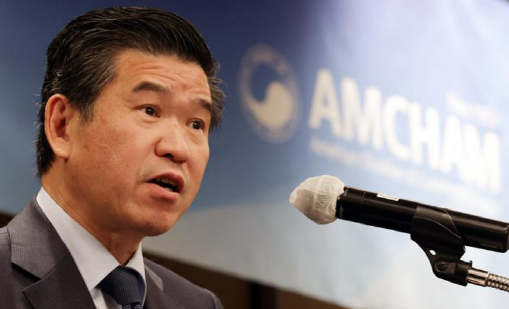
 >
>
>
>
2024.07.25
U.S. firms in Korea express concerns over pro-labor bill
AMCHAM says 'yellow envelop law' will make global investors leave Korea

By Park Jae-hyuk,
The Korea Times - U.S. companies doing business in Korea have started publicly
voicing concerns about the increasing possibility of a labor-friendly amendment
to the Trade Union and Labor Relations Adjustment Act, cautioning about its
potential adverse effects on Asia's fourth-largest economy.
American Chamber of
Commerce in Korea (AMCHAM) Chairman James Kim said in a statement, Thursday,
that the chamber fully supports the negative stance taken by Korea’s six
largest business associations regarding the pro-labor bill known as the
"yellow envelope law."
The bill aims to
empower subcontracted workers by allowing them greater negotiating leverage
with the clients of their employers, while also prohibiting management from
seeking compensation for damages incurred during illegal strikes.
Kim's statement
coincided with lawmakers from the main opposition Democratic Party of Korea
(DPK) and minor liberal opposition parties unilaterally passing the bill at the
National Assembly's Environment and Labor Committee, Monday.
Although the
Legislation and Judiciary Committee on Wednesday delayed its decision on
whether to bring the controversial bill to the plenary session, citing
escalating protests from the conservative ruling People Power Party, the
business lobby representing U.S. firms in Korea voiced concerns about the
bill's potential impact on the country's business environment.
“As highlighted in
our 2024 Business Survey, the unpredictable regulatory environment and unique
regulations in Korea are already significant challenges for the foreign
business community,” Kim said.
“The recent passage
of this bill only exacerbates these concerns by introducing uncertainty that
could deter investments and undermine Korea’s global standing as a competitive
business hub.”
AMCHAM also urged
the Assembly to reconsider this legislation and pursue a more balanced and fair
approach that protects the rights of both workers and businesses.
The bill earned the
nickname after citizens delivered yellow envelopes containing money in 2014 to
support unionized workers of SsangYong Motor. These workers had been ordered by
a court to pay a total of 4.7 billion won ($3.4 million) in compensation to the
automaker for their strike in 2009.
The opposition bloc
has consistently proposed the bill to enable subcontracted workers to negotiate
directly with the clients of their employers, even if these clients do not
directly employ those workers.
The proposed bill
also justifies strikes by subcontracted workers against their employers’
clients and bans management from demanding compensation for damage caused
during illegal strikes, unless they assess the damage caused by each
individual.
Although the
previous 21st Assembly passed the bill late last year, President Yoon Suk Yeol
exercised his veto and eventually thwarted the revision.
Since the opposition
bloc’s resounding victory in the general elections in April, Korea’s two
largest umbrella unions have begun to urge lawmakers at the current Assembly to
seek the revision again, claiming that damage claim suits against unionized
workers could threaten their existence.
However, the
business-friendly Yoon administration has maintained a firm stance on the bill,
indicating that the president may exercise his veto once again.
Amid the increasing
controversy, Chairman Sohn Kyung-shik of the Korea Enterprises Federation, a
major business lobby in Korea, held a meeting with Assembly Speaker Rep. Woo
Won-shik to voice concerns regarding the yellow envelope bill.
Sohn claimed that
the proposed law will encourage labor disputes and illegal strikes.
Source: https://www.koreatimes.co.kr/www/tech/2024/07/419_379351.html?na